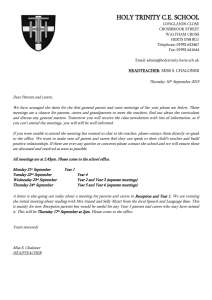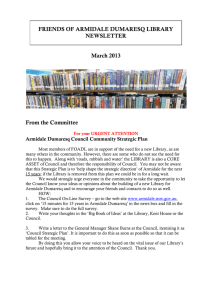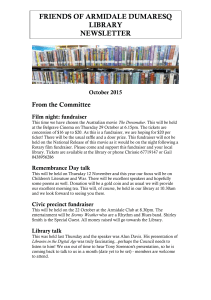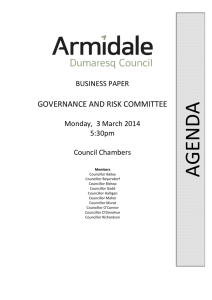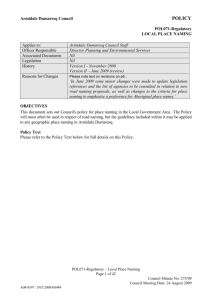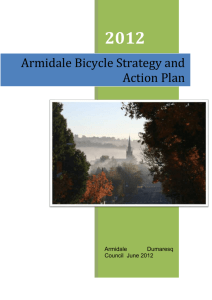August 2015 - WordPress.com
advertisement
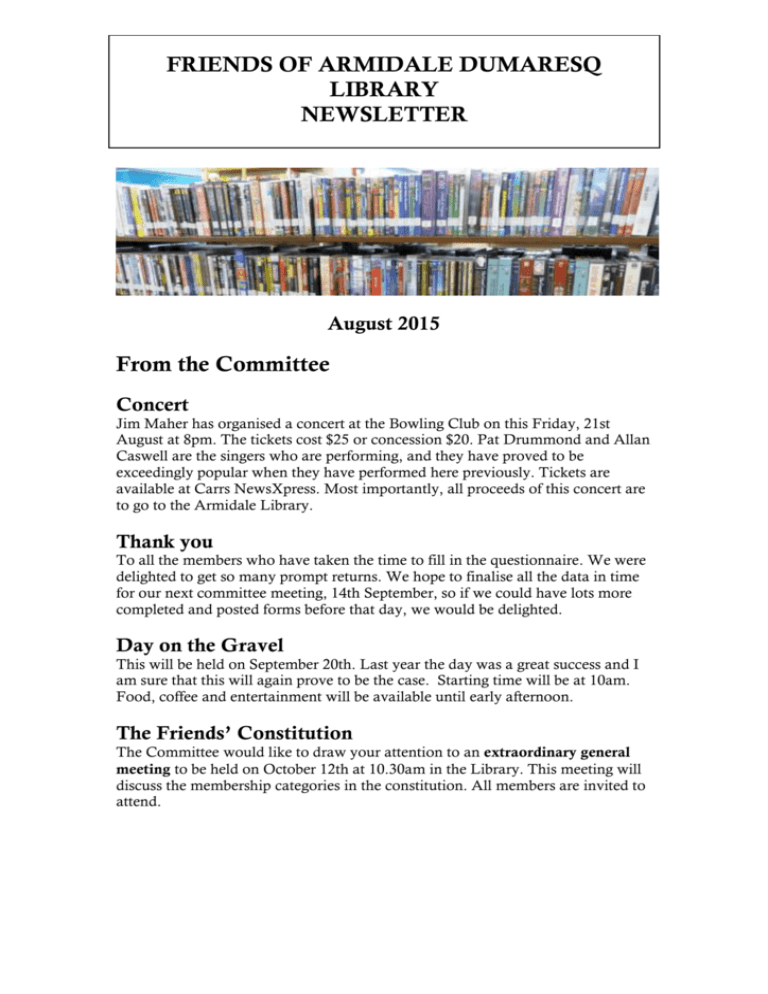
FRIENDS OF ARMIDALE DUMARESQ LIBRARY NEWSLETTER August 2015 From the Committee Concert Jim Maher has organised a concert at the Bowling Club on this Friday, 21st August at 8pm. The tickets cost $25 or concession $20. Pat Drummond and Allan Caswell are the singers who are performing, and they have proved to be exceedingly popular when they have performed here previously. Tickets are available at Carrs NewsXpress. Most importantly, all proceeds of this concert are to go to the Armidale Library. Thank you To all the members who have taken the time to fill in the questionnaire. We were delighted to get so many prompt returns. We hope to finalise all the data in time for our next committee meeting, 14th September, so if we could have lots more completed and posted forms before that day, we would be delighted. Day on the Gravel This will be held on September 20th. Last year the day was a great success and I am sure that this will again prove to be the case. Starting time will be at 10am. Food, coffee and entertainment will be available until early afternoon. The Friends’ Constitution The Committee would like to draw your attention to an extraordinary general meeting to be held on October 12th at 10.30am in the Library. This meeting will discuss the membership categories in the constitution. All members are invited to attend. Book review The Strays Emily Bitto This debut novel by Emily Bitto won the 2015 Stella prize for women writers. It is set in Melbourne in the 1930s, at a time when there were moves to throw off the shackles of conservatism in Art. Told from the point of view of eight year old Lily, the story proper commences when she meets Eva, the daughter of avantgarde artist, Evan Trentham. Fascinated with the freedom allowed Eva and her sisters, Bea and Heloise, Lily longs to become part of their large family of resident artists. She finds the conforming ways of her parents stifling in the light of this interesting and hedonistic family. Lily becomes a stray in the Trentham family as do many of the artists revering Evan’s unconventional work. The narrative progresses with Lily spending more and more time with Eva and her family. The girls form a very close friendship and indulge their fantasies unchecked while Eva’s parents pursue their artistic ambitions. Eventually, the lack of parental engagement with the children leads to disastrous consequences in their teenage years. I loved this book. It is beautifully written in elegant prose and maintains a wonderful tension throughout. I recently borrowed a number of books from the library and enjoyed them all. However, this was the stand out book and I can highly recommend it as an excellent read. Marnie French. Events in the Library Community discussion 2015 Great Books in the Library series continues Wednesday 2 September 5.30-6.30pm A conversation with Robyn Bartel and Jennifer Clark Credited with inspiring the modern-day environmental movement, Silent Spring (1962), by Rachel Carson, challenged readers to acknowledge the effects of human behaviour on the Earth. As human activities continue to have a negative impact on our environment, it is timely to reflect on the legacy of this great book, and the lessons it still holds for us. We invite you to join us from 5.30-6.30pm on 2 September for a literary discussion event in the Armidale Library. Presented by historian of the 1960s, Professor Jennifer Clark, and legal geographer, Dr Robyn Bartel, who is a leading authority on environmental law and the interactions between humans and landscape, and co-founder of AELERT, the Australasian Environmental Law Enforcement and Regulators Network. Book launch Thursday 17 September 5-6.30pm During National Foster Care Week, 13-20 September 2015, the local foster care agency Foundations Care is asking local residents if they can ‘make a difference?’ With over 30 years’ experience in supporting children, young people and their families, Foundations Care values and recognises the important role foster carers play in ensuring the best possible outcomes for our most vulnerable children. Foster carers are ‘ordinary people doing extraordinary things.’ We welcome carers from all walks of life; single carers, married couples, same sex couples, childless carers, carers of all ages and all cultural backgrounds - we need you! To help celebrate Foster Care Week 2015, Foundations Care has the pleasure of announcing a book launch of Australian author Naomi Hunter’s first picture book- A secret safe to tell - at the Armidale Dumaresq War Memorial Library on Thursday 17 September between 5 and 6.30pm. A secret safe to tell is an empowering story for both children and adults alike, exploring the journey to safety after sexual abuse, and is a must for all school and family libraries. The event will include a discussion hosted by author Naomi Hunter, on child protection and safety of all children and young people in today’s busy world. Copies of Naomi’s book will also be available for purchase on the night. For more information on foster care or the book launch, please contact Kylie at Foundations Care on 6707 1000. New in the Library Here’s an unexpected approach to economics and motivation: John Kay, an Englishman, writes of Obliquity: why our goals are best achieved indirectly, acknowledging complexity, incompleteness, pluralism and even muddling through as worthwhile considerations towards better decision-making. Jeffrey Lieberman probes the redeeming features of another skeptically-regarded profession with Shrinks: the untold story of psychiatry. Alberto Manguel praises the inquisitive spirit over 377 pages in Curiosity, with its smart cover design. Curiosity has driven Lisa Kemmerer to write Eating earth and explore environmental ethics and dietary choice. Tim Anderson has come out of Wisconsin, driven by Iron Chef, to love Japan and share its vigorous southern barbarian food (“brash flavours like garlic, pork fat, chilli, sweet potatoes…”) with Londoners in Nanban: Japanese soul food. Eric Kayser brings us a refined The Larousse book of bread: recipes to make at home and Richard Turner sates our appetites with 350 pages devoted to Hog: proper pork recipes from the snout to the squeak: which leads us to an antidoting slim new volume on Gout: answers at your fingertips. Eric Chaline also examines the best workings of our bodies in The temple of perfection: a history of the gym, and Mark Hallett displays his connoisseurship of Sir Joshua Reynolds: portraiture in action. Creative work is also on display in Sarah’s Thompson’s beautiful book on Hokusai; in Gretschen Hirschauer’s astonishing Piero di Cosimo: the poetry of painting in Renaissance Florence; Paul Binski’s richly documented Gothic wonder: art, artifice and the decorated style, 1290-1350; and Harriet Edquist’s National Gallery of Victoria study Shifting gear: design, innovation and the Australian car (including the Holden Efijy concept car from 2005). Three-dimensional creation is also open air in Jane Powers’ The Irish garden and Alain le Toquin’s Secret gardens. The fruits of wildness are harvested by Morris Lake (Australian rainforest woods: characteristics, uses and identification) and over one hundred participants in the ABC Radio National’s Trees Project which compiled the book In their branches. Meanwhile, underwater wildness is even more inconceivable: both Christian Sardet (Plankton: wonders of the drifting world) and Philip Hastings (Fishes: a guide to their diversity) try to come to terms with mind-bending morphologies. The shape of things also intrigues Heidi Julavits: her The folded clock: a diary tells of selftransformation – she found her old diaries in a storage bin, and hoped to discover the early evidence of the person she'd since become. Instead, 'The actual diaries revealed me to possess the mind of a paranoid tax auditor', with daily chronicles of anxieties about grades, looks, boys, and popularity. After reading the confessions of her past self, she decided to try again, to chronicle her daily life as a forty-something woman, wife, mother, and writer. The result is a meditation on time and self, youth and aging, betrayal and loyalty, friendship and romance, faith and fate, marriage and family, desire and death, gossip and secrets, art and ambition; and the focus shifts from the woman she wants to be to the woman she may have become… Oliver Sacks (author of The man who mistook his wife for a hat) reveals his story in a more traditional mode with On the move: a life. Francisco Goldman, whose novel Say her name helped him express grief over the accidental death of his wife just before their second anniversary, has moved on five years later to write of his home town with all its remarkable and menacing challenges in The interior circuit: a Mexico City chronicle. Robert Christgau, the “dean of American rock critics”, also examines his lifetime environment in Going into the city: portrait of a critic as a young man – based in New York, but including these events – “Coltrane in the East Village, Muddy Waters in Chicago, Otis Redding at the Apollo, the Dead in the Haight, Janis Joplin at the Fillmore, the Rolling Stones at the Garden, the Clash in Leeds, Grandmaster Flash in Times Square, and every punk band you can think of at CBGB”. Where else can we go this month? Kyrgyzstan, introduced by Laurence Mitchell as “the most hospitable and least repressive of the newly emerged central Asian republics”; Europe in the nineteenth century, transformed by being seen through the eyes of a writer in Urdu and translated for the first time into English as Between worlds: the travels of Yusuf Khan Kambalposh; and Carole Satyamurti also effects a transition from the subcontinent to the English-speaking world by publishing Mahabharata: a modern retelling of the Sanskrit three million word epic in a mere 888 pages. Philip Pullman says that her blank verse rendition “propels the reader effortlessly onward through the cosmic, earthy, terrifying, erotic, sublime events of this extraordinary work”. We have also received a first volume of the life of the Buddha as graphically conceived by Osamu Tezuka, creator of Astro Boy. Our musical interlude this month consists of the first CDs in Maria Callas’ complete studio recordings, entitled Maria Callas remastered. The series consists of 26 operas and 13 recitals first recorded between 1949 and 1969: the Observer critic concluded “this set is a beacon illuminating the mysterious but indispensable art of Maria Callas”. Slightly more contemporary is Wyclef Jean, out of Haiti via the New York projects, who presented The carnival featuring Refugee Allstars in 1997, including a wonderfully co-opted version of the BeeGees’ Staying alive entitled We trying to stay alive. Lucinda Williams returns with compassion Down where the spirit meets the bone. And Father John Misty (also known as Joshua Tillman) confesses I love you, honeybear: one notable track really justifies his categorization as an alternative rock musician, as he laconically sings to a live audience Bored in the USA. Our fiction selection is designed to avoid ennui, starting with Neal Stephenson’s Seveneves. This speculative fiction imagines humans returning to Earth five thousand years after a catastrophic event rendered the place a ticking time bomb. Meanwhile, in Australia in the years following World War II, Peter Doyle's novels explore criminal underworlds, political corruption, and the post-war explosion of sex, drugs, and rock 'n' roll – we have The devil’s jump and Get rich quick, both well-written enough to be published in the USA. Yuri Herrera also explores underworlds, back and forth across the Mexico-US border in Signs preceding the end of the world. And Melissa Harrison’s At hawthorn time might seem like an idyll in the British countryside, but envisages “Four-thirty on a May morning: the black fading to blue, dawn gathering somewhere below the treeline in the east. A long, straight road runs between sleeping fields to the little village of Lodeshill, and on it two cars lie wrecked and ravished, violence gathered about them in the silent air. One wheel, upturned, still spins”. Our new DVDs are often older titles, requested by library members, filling out the collection or recently rediscovered. In such cases, we often have to search overseas. So, for instance, the admirable Sidney Poitier in Porgy and Bess from 1959; Robert Altman’s Short cuts (1993), based on Raymond Carver’s book of the same name; Chips Rafferty in Bitter Springs from 1950; and, even further back, Douglas Fairbanks and Mary Pickford in a 1929 version of The taming of the shrew. Alternatively, we also pursue the latest titles which have not made it to Australian shores. So, the third series of Braquo (“France’s answer to The wire”); Jauja, judged one of the best 10 films of 2014 by 112 contributors to Sight and Sound magazine’s annual poll (and praised by Roger Ebert for its direction, acting – Viggo Mortensen – and its setting: “The wind, the chirping birds, the gently lapping waves all center the mind, and this both amplifies the film's physical beauty and makes the increasingly shocking events seem eerier, more dreamlike”); and the 2015 documentary Drone, whose cover description is shockingly direct: “Point. Click. Kill. The truth behind [the] secret CIA drone war”. Please also be aware that we have, in the collection or on order, 11 of the 13 films featured in this year’s Armidale International Film Festival.




